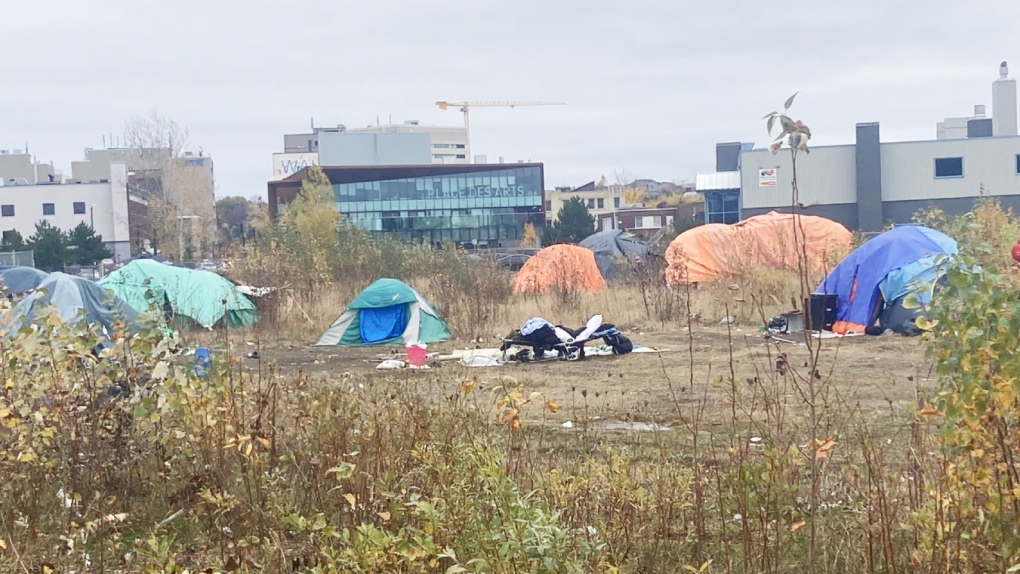Greater Sudbury funds two overnight warming centres for the homeless
With shelters at capacity and a need to keep people warm as winter nears, Greater Sudbury is funding two overnight warming centres this fall and winter.
A more permanent initiative providing programming that could lead to permanent housing for some will also open early next year.
 Gail Spencer, the Greater Sudbury's manager of housing stability and homelessness, said they know of 212 people living in encampments across 42 locations in the city. (Alana Everson/CTV News)
Gail Spencer, the Greater Sudbury's manager of housing stability and homelessness, said they know of 212 people living in encampments across 42 locations in the city. (Alana Everson/CTV News)
A trailer at Energy Court was originally scheduled to open Nov. 1 as an overnight warming centre, but the city said due to administrative delays, the goal now is to open by the end of November.
Gail Spencer, the city's manager of housing stability and homelessness, said the number of people without housing is growing.
"Currently we know of 212 people living in encampments across 42 locations," Spencer said.
"This continues to increase and we know that there is a need for people to have a safe warm place to go this winter."
The overnight centre is in addition to one at the Samaritan Centre that opened Oct. 1.
City officials said the centres are being funded by the city until the end of April at a cost of just under $1 million.
"Always our goal is to fund longer-term … more permanent transitional housing supports," Spencer said.
"Although warming centres are an important part of … how we connect with people … we do like to have funding that is focused on longer-term housing solutions."
Transitional housing project
The city said construction on the Lorraine Street Transitional Housing Project continues and it’s expected to open sometime in the first quarter of 2025.
"As a transitional housing program, it’s not intended to be permanent," Spencer said.
"People can stay there for up to 18 to 24 months while they stabilize, they participate in programming, they improve their health and well-being. The goal is that then they will be able to transition out into the community."
The transitional housing project will offer 40 units and the highest level of support housing the city has ever offered for chronically homeless people dealing with mental health and substance issues.
- Download the CTV News app now
- Get local breaking news alerts
- Daily newsletter with the top local stories emailed to your inbox
The city said it’s up to the client if they want to enter the program.
"It provides a lot of ... clinical support through registered nurses, addiction medicine specialists, psychiatry, and it is really intended for people (who) need that extra support to get housed and stay housed," said Spencer.
City officials said one of the top priorities is working towards recommendations in the Roadmap to End Homelessness by 2030 approved by city council in May.
CTVNews.ca Top Stories

Sparks fly as MPs question minister on pension implications of proposed election date change
Sparks flew at a parliamentary committee Thursday as MPs questioned Canada's democratic institutions minister about a widely opposed provision in electoral reform legislation that seeks to delay the next fixed election date by one week.
'There is no electricity': Canadian travellers in Cuba urge caution in hurricane's wake
Cuba's power grid was knocked out by Hurricane Rafael, which ripped across the country as a Category 3 storm. In western Cuba, it toppled buildings and pushed 50,000 people to find shelter elsewhere. Cubans were already enduring rolling blackouts due to energy shortages.
Three charged in One Direction singer Liam Payne's death
Three people have been charged in relation to One Direction singer Liam Payne's death in a fall from his Buenos Aires hotel balcony last month, Argentine authorities said on Thursday.
RCMP already 'on high alert' for potential wave of migrants after Trump election
Canada's federal police force has been preparing for months on a contingency plan for a potential massive influx of migrants across the border following Trump's promise of 'mass deportations' of millions of undocumented immigrants in the U.S.
'There was no stopping this baby from coming': Woman gives birth while aboard Newfoundland ferry
A young family from Codroy Valley, N.L., is happy to be on land and resting with their newborn daughter, Miley, after an overwhelming, yet exciting experience at sea.
Volkswagen models recalled for airbag safety precaution
Recall notices have been issued for some Volkswagen models from 2006 to 2019 for airbag safety issues.
Canmore wildlife and landscape defender Karsten Heuer dies peacefully at 56
Canmore conservationist Karsten Heuer, who was a biologist, park ranger, author and activist, has died.
America votes: How celebrities are reacting to Trump's decisive victory
Celebrities from Hulk Hogan to Ariana Grande are sharing their reactions to the U.S. election, which will see Donald Trump return to the White House.
3 Winnipeg police officers charged with breach of trust, theft
Three members of the Winnipeg Police Service have been charged with breach of trust, obstruction of justice and theft following a lengthy investigation


































